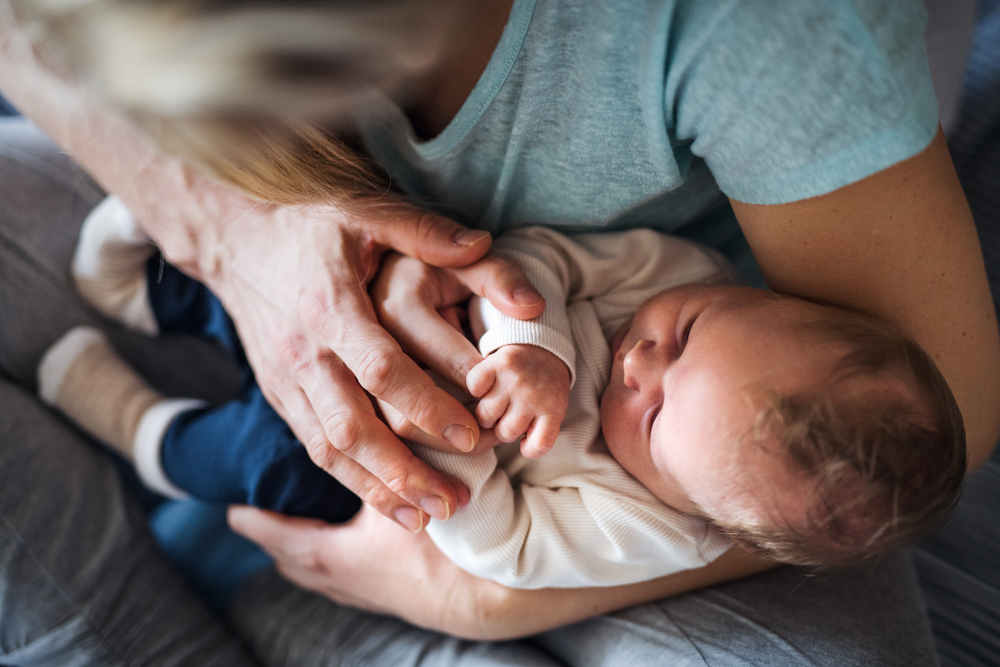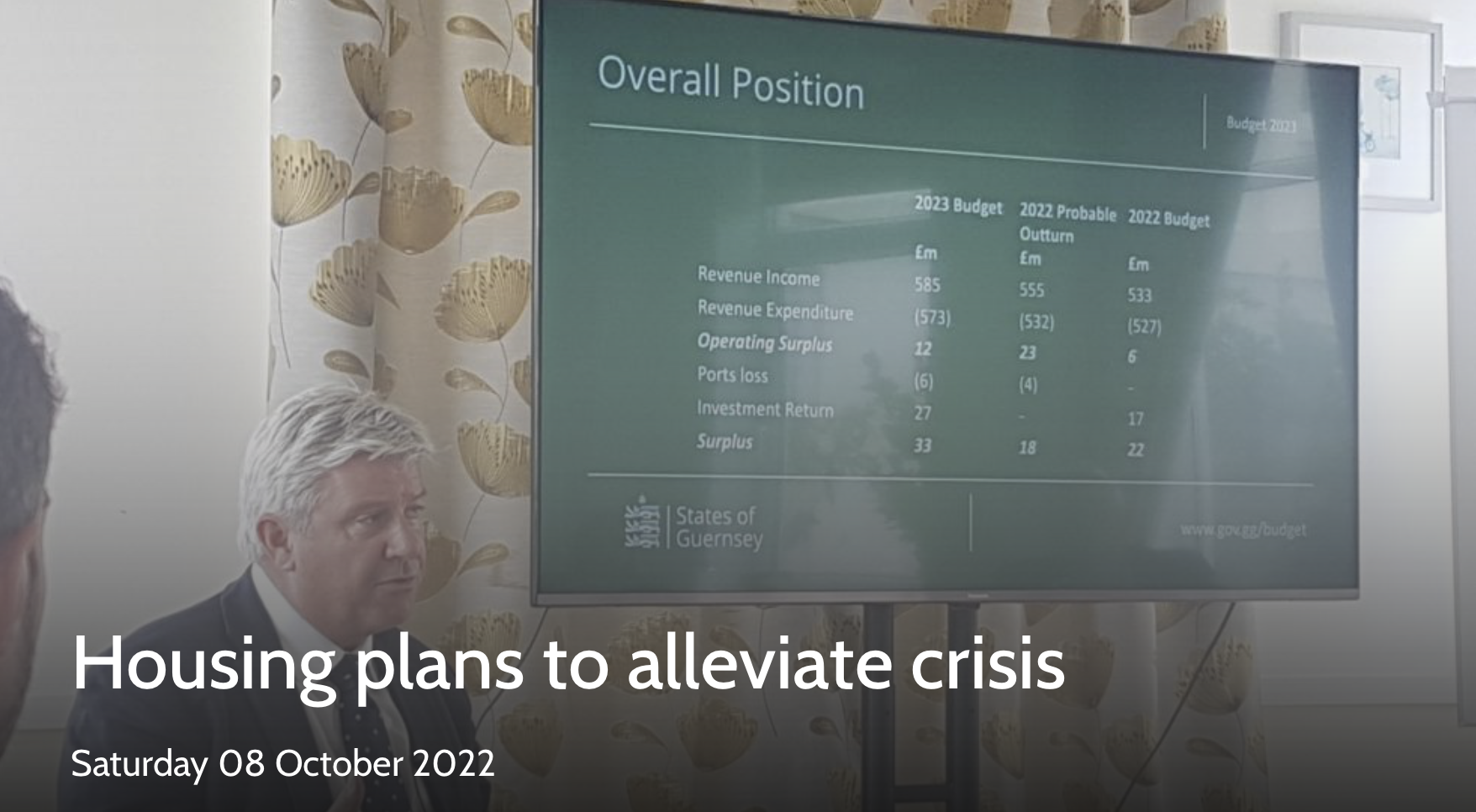


With Guernsey's population currently the largest it has ever been, and house prices this week confirmed to have jumped 50% in five years, we've tried to marry up the ways the island is looking to address two conflicting but connected problems.
In March last year, 63,711 people were living in Guernsey, and Herm, with a States resolution agreed later last year to grow the population by a net 300+ per year.
At the end of 2021, there were said to be 27,371 residential properties in the island - 95% of which were local market.
According to those two sets of statistics, that would mean 2.3 people on average sharing each residential unit.
However, the problem is not where each person will live - but rather it's the make up of the different homes across the island with increasing numbers of solo living, meaning increasing numbers of accommodation are needed to house everyone.
Deputy Peter Roffey - President of the Committee for Employment and Social Security, which is responsible for social housing - has expressed his concern that population changes are driving the housing crisis.
A lot of focus has been on the census result of 400+ rise in our population in just 1 year. But for me the key finding is that increased population, coupled with falling household sizes, means we have 1,000 more households than 5 years ago. The real driver of our housing crisis.
— Peter John "Rufus" Roffey (@PeterRoffey5) February 1, 2023
The latest population statistics were published last week setting the population at 63,711 at the end of last March.
There hasn't been an official census since 2001, which takes a snapshot of the island's population on one date, instead the data is now collated through other sources including family allowance payments and income tax contributions.
The net migration of +491 people seen during the 12 months to the end of March 2022 was the highest Guernsey has seen for more than a decade.
The island's birthrate has fallen almost consistently over the last ten years with small increases recorded in 2016, 2020 and last year.
The island's death rate has held static over the past decade at between 511 and 586. The year with the lowest recorded deaths was 2020 (511) while the most were recorded in 2017 (586).

The average life expectancy at birth in Guernsey is 83.5 years. The life expectancy for women remains higher at 85.7 years with men at 81.4 years.
With the population growing slowly, but steadily, and with a States resolution to grow the population by 300+ through net migration per year, the pressure on the island's limited housing stock grows too.
The latest population data shows there was a minimum of 25,244 households in Guernsey on 31 March 2022, which is in fact fairly static compared to each year since 2017.
In 2021, there were 25,032 households and in 2017 there were 24,280.
Of the island's total population - 738 people had no known address in March last year. The other 62,973 people were split between the 25,032 households giving an official average occupancy of 2.5 people per residential unit.
Now, while the number of residential units has not changed dramatically since 2017, the composition of those households has.
The ten most common household types last year were those with two adults between the ages of 16 and 64 sharing. The next most common was solo adults of working age - between 16 and 64.
The data shows that the proportion of one adult occupancy households increased between 2017 and 2022, with the largest increase seen in households with one resident aged between 16 to 64.
The proportion of all households with at least one person aged 65 or more also saw an increase between 2017 and 2022. In contrast, households containing two or more adults aged 16 to 64 decreased between the same period.

Pictured: The composition of households has changed with more people living alone and fewer traditional family units living together.
The largest decreases were seen in the number of households shared by three or four adults all aged between 16 and 64, and the number of households with two adults between 16 and 64 and one or more child aged 15 or under.
The increase in solo adult households or in homes shared by two adults and either children, or adult children, could be attributed to people living longer.
Problems with the number of houses available to buy and rent have been coined as a crisis in recent times with repeated reports of a lack of stock in both sectors.
House sales bounced back immediately and with gusto after the first covid wave with estate agents among those benefitting as people paid over and above asking prices. While sales have slowed and prices appear to be stabilising, they remain expensive by any scale.
Regardless of price, the lack of availability has caused concern - with rental properties hard to come by and housing for essential workers being put at the top of the priority list for construction.
P&R published the Government Work Plan in May last year with housing and the cost of living the priority.
Releasing the plan, the Committee's President, Deputy Peter Ferbrache, said: "For this coming year, the pressure on our housing market is one area that we must address urgently, as it creates challenges in many other areas, socially and economically.
"We have taken some important steps, but we must do more, quickly."
The Committee asked the States to back actions "to increase the supply and affordability of private housing and housing for key workers coming to the island and to press ahead with proposals to transfer States' social housing to the Guernsey Housing Association".
Those plans have been fleshed out with P&R now asking the States to agree the building of 1,565 new residential units by 2027.
Delighted @CI_Coop received outline planning permission for the development of Leale’s Yard today. A positive step forward on the journey for this important development. A lot of work has gone into getting us this far, thank you for all of the support from everyone involved. pic.twitter.com/dTxPtGOW9d
— Mark Cox (@MarkCoxJsy) November 16, 2022
The GHA for its part has progressed plans for developing new housing at various locations - in total it is working on delivering 650 homes after the States allocated £32.6m towards additional affordable housing units last year.
These would be primarily at Fontaine and Kenilworth Vineries, the former Channel Island Tyres site, the data park site, and the redevelopment of Les Genats – all of which have been actioned this political term.
These will be used for social rental, partial ownership, key worker housing and specialist HSC accommodation.
Construction will also begin on 14 units for adults with learning disabilities at La Vielle Plage in 2023.

Pictured: Deputy Mark Helyar included plans for housing in his 2023 Budget.
The 2023 Budget sought to release pressure on the housing market too with tax breaks for first time buyers and those looking to downsize, extra taxes payable by second home owners and those who leave properties to rot, and changes to TRP.
Guernsey has long been considered an expensive place to own a home - with property prices exceeding those in many parts of the UK and France.
Statistics published this week may have proven the point for many who fear they may never be able to afford to buy a home here with the average purchase price of a house now nearing £700,000 having increased by more than 50% in just five years.
Many sellers were able to capitalise on rising demand during and immediately post-pandemic which saw asking prices rise dramatically with some estate agents reporting that buyers were willing to enter into bidding wars.
Stuart Leslie, Head of Residential Sales at Savills Guernsey, said: "...it’s perhaps unsurprising that activity levels have cooled in terms of the number of transactions. Interestingly though, sales above £1m increased, possibly indicating less of a reliance on borrowing toward the higher end of the market."
He added: “Looking ahead, the island’s housing market should remain robust given the underlying demand and quality of life on offer – and we expect property to outperform the prime UK market over the next five years.”

Pictured: Stuart Leslie, Head of Residential Sales at Savills Guernsey.
Buyers signing contracts late last year or early this year will find themselves with mortgages agreed under the highest interest rates seen since the 1990s as inflation jumps in response to wider economic concerns across the British Isles as a result of covid, Brexit and the Ukraine war.
Those hoping to rent or enter into a partial ownership agreement through the Guernsey Housing Association are finding long waiting lists with 337 names on it in December 2021. Of these, 58% were waiting for a one bedroom property, 22% for a two bedroom property and the remaining 20% for a three or four bedroom property.
The GHA is responding to demand with designs for numerous one and two bed properties in various locations being progressed.
Average house prices soar over 50% in half a decade
FOCUS: '22 population growth exceeded States forecast
Tax breaks could encourage more affordable first-time homes
Housing plans to alleviate crisis
Developing 650 GHA homes will prove challenging
"A little of the heat has come out of the housing market"
P&R says States "must tackle" housing needs and cost of living
Comments
Comments on this story express the views of the commentator only, not Bailiwick Publishing. We are unable to guarantee the accuracy of any of those comments.